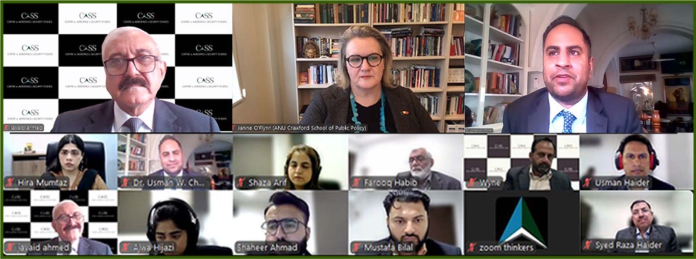ISLAMABAD, OCT 10 (DNA) : The Centre for Aerospace & Security Studies (CASS), Islamabad, recently hosted a webinar titled ‘Positive Public Administration: Lessons for Pakistan,’ which explored how the principles of positivity can drive effective governance in the country.
The event drew inspiration from the publication of the book ‘Pathways to Positive Public Administration’, a seminal volume that explores how the discourse of Positive Public Administration (PPA) can reshape public governance through optimism, resilience and innovation.
The webinar featured Professor Janine O’Flynn, Director, Crawford School of Public Policy at the Australian National University and one of the editors of the book, and Dr Usman W. Chohan, Advisor on Economic Affairs & National Development at CASS, who contributed a chapter on Pakistan’s response to the COVID-19 Pandemic through the lens of PPA.
Professor O’Flynn provided an overview of the emerging PPA discourse, explaining how its focus on positive, solutions-oriented governance can lead to tangible improvements in public administration. She discussed the evolution of PPA, highlighting its potential to reshape both academic thought and practical public administration approaches.
According to her, PPA is not limited to one region or culture but has the potential to be applied in diverse contexts, including Pakistan. She urged that in an increasingly complex and interconnected world, adopting a mindset of positivity and resilience is crucial for governments and public institutions to respond effectively to the challenges they face.
Dr Usman W. Chohan built on these insights by contextualising PPA within Pakistan’s experience, particularly its response to the global COVID-19 Pandemic. He noted that Pakistan had demonstrated immense capability during the Pandemic, successfully balancing public health imperatives with economic considerations. He argued that this example of positive administration offers important lessons for Pakistan’s future governance.
Dr Chohan stressed that positivity is not merely an aspirational concept but a necessary approach for tackling the country’s challenges, from economic recovery to social development. He pointed out that Pakistan has proven its capacity for success in the most difficult circumstances and that the country can replicate this success in other sectors with the right mindset.
Moreover, Dr Chohan emphasised that for Pakistan to continue on this positive trajectory, it is essential for all stakeholders, including government institutions, civil society, and the private sector, to work in unison. Collaboration and unity, he argued, will be key to building a future where positive public administration can thrive.
President of CASS, Air Marshal Javaid Ahmed (Retd), commended the hard work and intellectual rigour behind the book Pathways to Positive Public Administration.
He agreed that Pakistan has a unique opportunity to apply PPA principles to navigate global challenges and highlighted the need to foster optimism and cooperation in the public sector. He also noted that the face of public administration was evolving rapidly with the advent of emerging technologies, making it crucial for Pakistan to adapt and lead in this transformation.

















